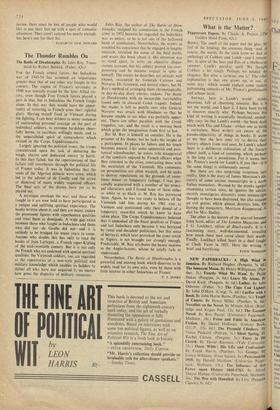What is the Matter? ) Chit
Peppercorn Papers. By Claude A. Prance. (the- Golden Head Press, 42s.)
BOOKS. The smell of the paper and the glue. the feel of the binding; the sensuous thing--and. of course, the words. In the sixth form we had an anthology of Cobbett and Lamb--and 1 remenr
I
her, in spite of the heat and flies of a Melbotirn summer. LaMb's peculiar spell. We though Cobbett a bit rough. Perhaps we needed thel elegance. But what a turncoat one is! The other explanation is that one grows up, or out. or some way----which would explain some undulY patronising remarks of Mr. Prance's gentlemanly and urbane book.
Anyway, here is Lamb's world: stable, decorous, full of charming minutia;. But it is not my world, and I hate it. I have been trying to discover exactly why. Perhaps because this kind of writing is essentially involuted, unshak- ably cosy. So that Lamb's world—the book deals much with Elia and Eliana- -strikes one as being a caricature. Most writers are aware of the pseudo-objectivity of things in books. It seems to me that the best ones try to derive their literary objects from real ones. In Lamb's school there is a deliberate cultivation of the literary object itself, a kind of cosseting, which perhaps in the long run is pernicious. For it seems that Mr. Prance's world (or Lamb's, if you like—it is the same thing) is deliberately unreal.
But there are two surprising irruptions into reality. One is the story of James Morrison's dis- covery of some ancient manuscripts in a north Italian monastery. Warned by the monks against examining certain texts, he ignores the advice, secretly investigates, discovers some manuscripts thought to have been destroyed, but also arouses an evil genius which almost destroys him. 00 leaving the monastery, Morrison disappeared. A
plot for Mrs. Shelley. -.
The other is the history of the quarrel between John Scott, editor of The London Magazine. and J. G. Lockhart, editor of Blackwood's. It is a fascinating story, well-documented, revealing how much these men cared about their words. Finally, Lockhart killed Scott in a duel fought at Chalk Farm in 1821. Here the writing is


































 Previous page
Previous page